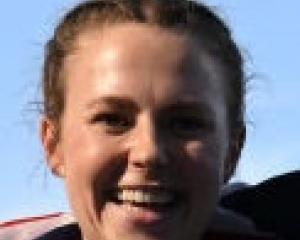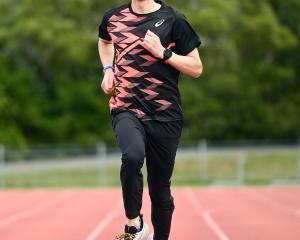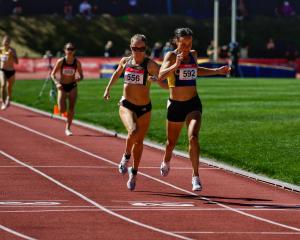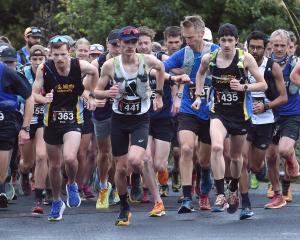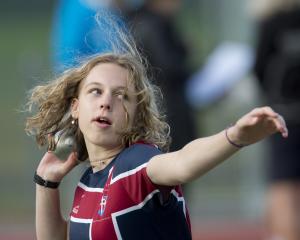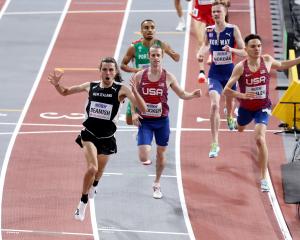Peter Meffan went to Kenya and Germany to do his medical elective and a bit of running, but ended up doing much more.
He trained with Kenyan 800m Olympic champion, world champion and world record holder David Rudisha, witnessed the devastating effects of HIV and met the man who inspired his trip.
Sports reporter Robert van Royen caught up with the Dunedin medical student this week.
It is a mild winter's day in Iten, a Kenyan town 2400m above sea level, and Meffan (24) is entered in the 5000m race at the town's championships in June.
The race director calls for runners to assemble for the start of the race in three minutes.
People scurry out of bushes and from behind the old stands and all of a sudden 70 runners are lined up.
By contrast, just two people have entered the 100m.
The runners are split up and Meffan, who is wearing one of his father's mountain running New Zealand singlets for good measure, is shoved at the end with the fastest Kenyans.
The gun goes and the first lap of the dusty track is completed in a scorching 60sec. Meffan is already ''out the back door'' and struggles through the 12.5 lap race at high altitude.
He manages to pass two athletes, who both promptly pull out of the race, because no one wants to be beaten by a mzungu - a white foreigner.
No matter what, Meffan is always last.
The race is won in 14min 14sec, but Meffan finishes in a career slow time, slower than his debut as a 14 year old.
''It was just crazy fast. It was like nothing I have ever experienced,'' Meffan said.
''It's amazing to go from running around Dunedin, winning the cross country championships and thinking you're top of your pool.
''Then you go over there and feel like one of the high school kids trying to keep up with the older guys.''
Meffan, a sixth year medical student at the University of Otago, spent six weeks in Iten, which has a population of about 40,000, and six weeks in Traunstein, Germany, for his elective.
His girlfriend Shona Cole, who is also a medical student, did her first stint in Brighton, England, before joining Meffan in Traunstein.
Meffan was inspired to mix his love for running with his elective by going to Iten after reading Adharanand Finn's book Running with the Kenyans.
Finn, who was 36 at the time, packed up his family and moved to Iten for six months in 2011 to run with the Kenyans.
His book gave Meffan an idea of what he could do and where he could find training groups, instead of paying big money to train in high altitude camps.
By chance, Finn returned to Iten for the first time since 2011 while Meffan was there, and the pair struck up a friendship.
''When I heard he was there, I thought maybe I will get to shake his hand,'' Meffan said.
''But we got to actually become friends and go for runs and talk about our experiences.''
Meffan's good fortune started before that, when he was sitting at a table three Irish priests had booked for lunch at the hotel he was staying at.
One of them was Br Colm O'Connell - David Rudisha's coach. O'Connell moved to Iten to teach at St Patrick's High School in 1976 for three months, but still has not left.
He was fascinated by Meffan's reason for coming to Iten and offered him a room, which just happened to be Rudisha's old room, at the boarding school.
Meffan had got himself into O'Connell's training group.
It was in Meffan's fifth week that he met Rudisha, who returned to Iten for a two week block of altitude training.
He was sitting in the lounge watching television when a giant Kenyan walked in and grabbed his hand.
''Rudisha,'' he said.
Meffan could not wipe the ''massive'' grin from his face.
''He has a huge smile, a big hand shake. You get pulled into his world,'' Meffan said.
''He is so chatty and really charismatic. All of the things that make a really good champion.''
Rudisha, who just last week defended his 800m world title in Beijing, did all his training, eating and relaxing in Iten with Meffan and the rest of the training group, which Meffan described as a surreal experience.
''His stride is huge. He's just a huge guy. You sort of end up trying to mimic him.
''From what I could see, he's always looking at his form and trying to be as springy as he can off his forefoot.''
After finishing his placement at Iten Hospital, Meffan dedicated his final week to training with the group.
The week included a trip in Rudisha's car to the nearby town of Tambach for a track session in 30degC heat, a brutal interval session with 199 Kenyans, and another track session where the front runners clocked a 51sec 400m and three 300m runs, two of them in 38sec and the other a second quicker.
''Rudisha blew everyone out of the water that day,'' Meffan said.
Rudisha was not the only renowned Kenyan runner Meffan trained with or saw in action in Iten.
Three time 1500m world champion and 2008 Olympic gold medallist Asbel Kiprop won the 800m in the Elgeyo Marakwet county championships, arguably the most competitive regional championships in the world.
Augustine Choge, the 2006 Commonwealth Games 5000m gold medallist, also joined Meffan and the training group for a session.
Apart from running, Meffan found going to work ''hard'' and the living conditions ''tough''.
He saw more meningitis cases in one day in Iten Hospital than he would see here in three years. He saw patients top and tailing in the same bed and more cases of malaria than he could count, and Tb ran rampant through the wards.
But that was not the hardest thing he dealt with.
''The hardest was probably having to see the young, 26 year old mum who had died of HIV. And she just had a piece of duck tape stuck to her head with her name and time of death,'' he said.
Meffan mostly ate ugali - a maize and water dish - which has the consistency of mashed potato and is tasteless.
He rarely ate meat - if he did it was goat - and otherwise ate spinach and eggs. He also had to get used to drinking warm, unpasteurised milk, which is served with every meal.
''Some days were tough,'' he said.
''The toughest week for me was week five, when our water pipe in the house burst and then the power went out.
''You couldn't shower, you couldn't watch TV, you couldn't do anything. It was a pretty dark few days in that week, but I'm glad I stuck it out, because the last week was the best week, where I got to seriously train with Rudisha.''
Meffan returned to Dunedin at the weekend and will wrap up his studies at the end of the year, before he and Cole head north to take up jobs as doctors at Tauranga Hospital.
He plans to compete in the national road relay championships in Christchurch next month, and also hopes to return to Dunedin in March for the national championships.


